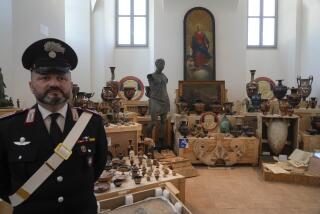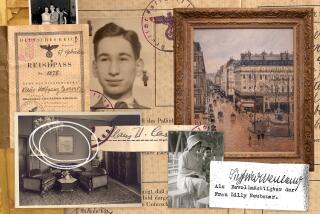Stolen Treasures Returning to German Church : Art: The heirs of a soldier who found the priceless objects and sent them to Texas at the end of WWII receive a total of $2.75 million.
- Share via
DALLAS — A collection of medieval art treasures that an American soldier took out of Germany at the end of World War II will be returned to a German church under a settlement announced Monday.
In exchange, the soldier’s family will receive about $1 million, The New York Times reported today. The payment will raise to nearly $2.75 million the amount the soldier’s heirs get for relinquishing the treasures, the newspaper said.
The agreement was reached after an eight-hour meeting in London between representatives of the soldier’s family and the Lutheran Church of Quedlinburg, said Steve Rahhal, a Dallas attorney whose firm represents the church.
Two members of the Interior Ministry of Germany were also present, Rahhal said. The settlement contained a financial agreement, but attorneys for both sides refused to discuss the terms.
The soldier, Joe T. Meador, died in 1980, leaving the collection to his brother, Jack Meador, and sister, Jane Meador Cook.
Thomas R. Kline, an American attorney representing the church, told the newspaper that he was pleased.
“The total expense for recovery of all the treasures is less than the sum originally allocated by the German government last April for one manuscript from the hoard, the so-called Samuhel Gospels,” Kline was quoted as saying.
Germany’s Cultural Foundation of the States, created for the recovery of lost cultural property, agreed in April to pay the Meadors $3 million for the gold-lettered and jewel-encrusted 10th-Century manuscript, the newspaper said.
The newspaper said John S. Torigian, an attorney for the family, eventually received $1.75 million for the manuscript. But the rest of the money was withheld from the Meadors when their claim to the artworks was challenged.
An art investigator working with the Prussian Cultural Heritage Foundation tracked the Quedlinburg treasures in May to Jack Meador’s home in Whitewright, a town 60 miles north of Dallas.
The church then sued to regain the works, charging that Meador stole the cache of priceless objects, which were hidden in a mine in the Quedlinburg area of what until recently was East Germany.
Meador told a friend that he stumbled onto the treasure during a battle and simply shipped them home in a plain brown wrapper. U.S. forces occupied the area about 120 miles southwest of Berlin in 1945.
The treasures include a 10th-Century Byzantine rock-crystal flask and an ivory comb inlaid with precious stones. But most of the gold, silver and jewel-studded treasures are reliquaries, or containers in which relics are kept and displayed for veneration.
Dietrich Koetzche, a German art expert who inspected the relics for the church last year, has said that the objects “rank among the three most significant medieval church treasures in Germany.”
Before its return to Germany, the collection will be briefly displayed at the Dallas Museum of Art, where it has been kept under court order since last summer.
“There are a number of details to the agreement, but we expect that the items would be returned to Quedlinburg somewhere between 45 and 60 days,” Randol Mathis, a Meador family attorney, said in a telephone interview from London.
“It was an extremely cordial negotiation,” Mathis said. “We believe that everyone is pleased with the settlement that was reached.”
More to Read
Sign up for Essential California
The most important California stories and recommendations in your inbox every morning.
You may occasionally receive promotional content from the Los Angeles Times.













